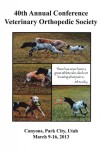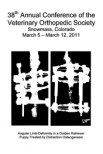Objective
To assess the effects of an intra-articular (IA) lidocaine or bupivacaine injection on synovial fluid (SF) biomarkers of cartilage metabolism.
Study Design
Experimental.
Animals
Horses (n = 6).
Methods
The study had 2 components, each with an identical design: the first arm assessed the effects of bupivacaine (0.5%) IA in the intercarpal joints and, after a 2-week washout period, the second was conducted to evaluate the effects of IA lidocaine (2%) in the tarsocrural joints. The mares were randomly assigned to receive the test local anesthetic in the target joint or the placebo (0.9% NaCl) in the contralateral joint. After a 2-week washout period, treatments were reversed, yielding 6 joints for each treatment. SF samples were collected for measurement of biomarkers of cartilage metabolism.
Results
IA bupivacaine or lidocaine induced a significant increase in both markers of cartilage matrix synthesis (CS846–aggrecan and CPII–type II collagen) suggesting an anabolic effect. Bupivacaine also resulted in an unanticipated decrease in both collagen degradation markers (C2C and C1,2C).
Conclusions
These results reveal an anabolic effect of single IA injections of local anesthetics on cartilage metabolism. Although collagen degradation biomarker results were not increased, it is possible that the anabolic response is because of an undetected cartilage insult, and requires further investigation.









